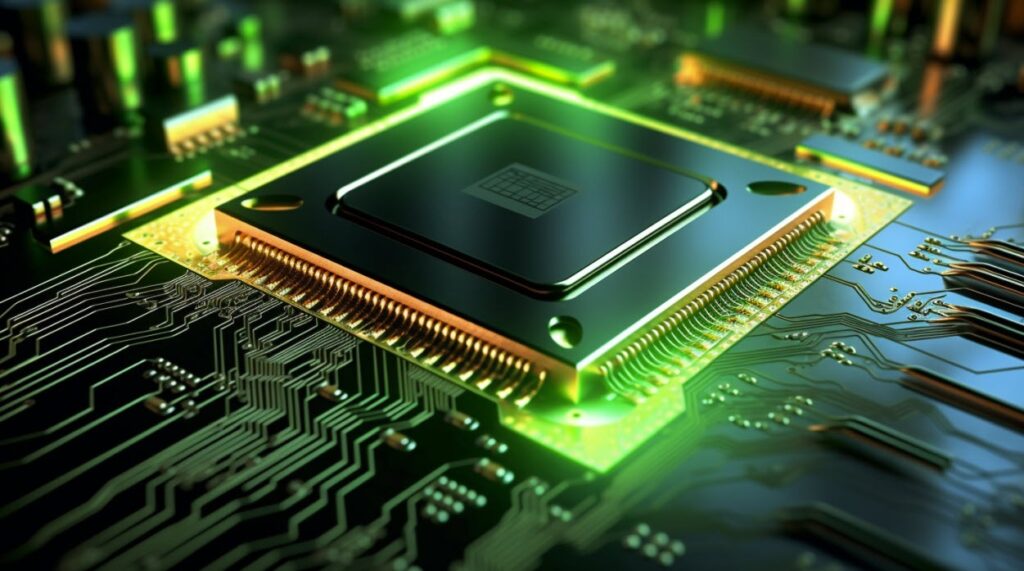Nvidia, a pioneer in the semiconductor space, is launching a major project to create a Chinese-market-specific version of its most recent flagship AI chips. The tight export restrictions that the United States has implemented in recent years are carefully matched with this trend. The business has been making waves in the IT sector with the release of their much awaited “Blackwell” chip series, which has attracted a lot of interest. The B200 chip is one of the series’ most noteworthy innovations; it can do tasks like chatbot response generation up to 30 times faster than its predecessor did.
The B200 chip’s enhanced speed and efficiency represent a major leap forward in artificial intelligence technology. This progress underscores Nvidia’s commitment to advancing AI capabilities and pushing the boundaries of what is possible with semiconductor technology. The B200 chip is designed to handle complex AI tasks with remarkable speed, making it a powerful tool for applications ranging from conversational AI to data processing and beyond. Its introduction marks a significant milestone in Nvidia’s ongoing efforts to drive innovation in the AI sector.
In response to the evolving geopolitical and regulatory landscape, Nvidia is collaborating with Inspur, one of its major distribution partners in China, to bring a specialized version of this chip to the Chinese market. This chip, tentatively named the “B20,” represents Nvidia’s strategy to comply with the U.S. export controls while continuing to serve the Chinese market. The B20 is designed to meet the specific needs and requirements of Chinese customers while adhering to the regulations that aim to prevent advanced computing technology from being used for military purposes.
The U.S. government tightened export controls on high-performance semiconductors to China in 2023, reflecting concerns about the potential use of advanced computing technology in enhancing China’s military capabilities. These controls are part of a broader strategy to limit the transfer of critical technologies that could have strategic implications. Nvidia’s response to these regulations involves developing chips that meet the export control requirements while maintaining their competitive edge in the market.
A key element of Nvidia’s approach is their partnership with Inspur. A major player in the B20 chip’s distribution and implementation is Inspur, one of Nvidia’s principal Chinese partners. Notwithstanding the regulatory obstacles, this collaboration guarantees that the new chip may be successfully launched into the Chinese market. By collaborating with Inspur, Nvidia hopes to manage the complexity of global trade and technology policy and make sure that its goods comply with US laws while still being available to Chinese consumers.
Nvidia’s proactive approach in designing a chip that complies with export controls while meeting the needs of the Chinese market demonstrates its commitment to maintaining a strong market presence in a challenging environment. The development of the B20 chip also highlights Nvidia’s strategic foresight in anticipating and responding to regulatory changes that impact its business operations. These developments demonstrate Nvidia’s ability to adapt to the changing landscape of global trade and technology regulations.
Introduced as a strategic move that highlights Nvidia’s capacity to strike a balance between innovation and regulatory compliance, the B20 chip is a step forward both technically and strategically. From AI-driven services to sophisticated data processing, the chip is anticipated to have a wide range of uses in the Chinese market. Its growth demonstrates Nvidia’s ability to foster technological innovation while navigating challenging regulatory contexts.
The development and distribution of the B20 chip illustrate Nvidia’s strategic approach to maintaining its market position and competitive edge in a rapidly evolving global environment. As the company continues to innovate and adapt to evolving regulatory landscapes, its efforts offer valuable insights into how technology firms can effectively manage international trade and regulatory challenges.
Nvidia has shown its strategic flexibility and dedication to innovation by taking the initiative to create an AI chip version that complies with US export regulations and targets the Chinese market. Crucial turning points in Nvidia’s efforts to strike a balance between market demands and regulatory compliance include the partnership with Inspur and the release of the B20 chip. Other tech companies navigating the complexities of international trade and regulatory issues can learn a lot from Nvidia’s approach as the global technology landscape continues to move forward.
If you like the article please follow on THE UBJ.
